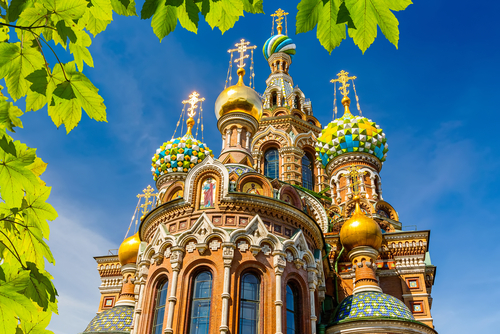|
Course unit code
|
Specialization 080500.68 – Management
|
|
Course unit title
|
Russia: Country Studies
|
|
Name(s), surname(s) and title of lecturer(s)
|
Elena Nadezhdina Y.
|
|
Level of course
|
Master
|
|
Semester
|
3
|
|
ECTS credits
|
3
|
|
Working hours
|
Contact hours
|
48
|
|
|
lectures
|
|
|
|
seminars
|
|
|
|
practical classes
|
48
|
|
|
laboratory classes
|
|
|
|
consultations
|
|
|
|
Self-study
|
60
|
|
|
Total
|
108
|
|
Work placement
|
Russia: Country Studies
|
|
Prerequisites
|
Good English skills
|
|
Language of instruction
|
English
|
|
Objectives of the course
|
Learning outcomes
|
A student’s assessments methods
|
|
. to train and improve cultural and professional competence in a foreign language and to acquire cross-cultural awareness skills. The course built on the principle of integration of knowledge of the English language with some academic disciplines as Russian history, culture, economics and geography.
|
Cultural competence
- being aware of the ethical and moral codes of behavior adopted in the Russian culture, social situations models, typical interaction scenarios
Linguistic competence
- developing a system of linguistic knowledge, including that of the main phonetic, lexical, grammatical, word-formation phenomena and rules of the studied foreign language, its functional varieties;
- being willing to overcome stereotypes and to participate in a cross-cultural dialogue in general and professional areas of communication.
|
Homework, short tests, presentation, and written exam.
|
|
Teaching methods
|
Practical classes, home assignments, presentations, self-study, role plays, brainstorming, projects (short-term projects, group and individual)
|
|
Course unit content
|
Gained knowledge and skills:
Upon mastering the discipline the student must have the following skills:
to know
- ethical and moral codes of behavior adopted in the foreign culture;
to be able to
- produce a logically structured report choosing the appropriate style for the audience;
- identify the right way to systematize information, classify data, organize personal work with electronic resources;
• to possess
- skills of expressing their thoughts and opinions in the interpersonal and business communication in a foreign language;
- a system of linguistic knowledge, including that of the basic phonetic, lexical, grammatical and word-formation phenomena.
|
|
List of Topics
|
Topic title
|
Contact hours
|
Assignments and independent study hours
|
|
Russian culture: traditions and customs
|
8
|
10
|
|
Geographical peculiarities:10 best places to see
|
8
|
10
|
|
Russian political power
|
8
|
10
|
|
Russian educational system
|
8
|
10
|
|
Tomsk History
|
8
|
10
|
|
Tomsk State university
|
8
|
10
|
|
|
48
|
60
|
|
Reading list
|
|
Year of publishing
|
Authors and title of the publication
|
|
2001
2000
2007
|
Land of the Firebird: The Beauty of Old Russia
by Suzanne Massie
Culture and Customs of Russia By Sydney Schultze Greenwood Press
Some glimpses into the history of Tomsk. Tomsk State University – by Nadezhdina E. Y. Shaturnaya E.A.
|
|
Additional reading
|
|
Year of publishing
|
Authors and title of the publication
|
|
1992
2007
2009
|
Russian Traditional Culture: Religion, Gender, and Customary Law By Marjorie Mandelstam Balzer M.E. Sharpe, 1992
Russia - Culture Smart!: the essential guide to customs & culture
by Anna King (Author)
Made in Russia: Unsung Icons of Soviet Design
by Michael Idov (Editor), Gary Shteyngart (Goodreads Author) (Contribution by), Lara Vapnyar (Contribution by), Boris Kachka (Contribution by), Vitaly Komar (Contribution by), Bela Shayevich (Contribution by)
|
|
Assessment requirements
|
Student’s skills in this subject will be evaluated by means of presentations, written tests and final examination
|
|
Assessment criteria
|
Assessment criteria for presentation:
- Topic introduced clearly, and purpose of talk was made clear.
- An interesting approach taken to topic. Speaker used techniques such as visual aids and props, anecdote, surprising facts, direct audience participation
- The presentation content and structure was tailored to the audience and to the intended purpose of informing, interesting or persuading.
- The vocabulary of the presentation was appropriate for the topic. Sentence structures were usually correct. The presentation content was usually grammatically correct Pronunciation and intonation is usually correct.
- Greetings are culturally appropriate. Questions are answered appropriately
- The presentation was summed up clearly
- Answers showed good knowledge and understanding of the topic. Language was mainly correct.
|
|
The composition of final accumulative mark
|
Participation: 30%
Home assignments, presentation): 40%
Exam at the end of the course 30%
|
|
Author of the course
|
Elena Nadezhdina Y
|

.png)